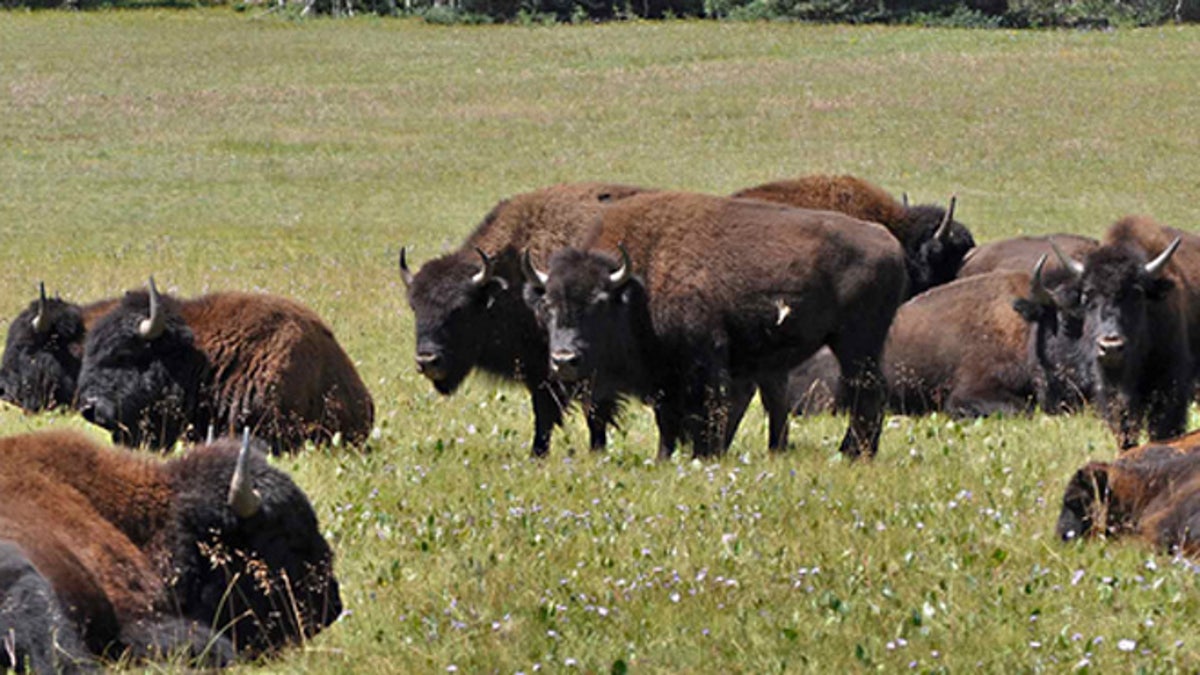
FILE: Bison seen in Arizona's Kaibab National Forest. (United States Department of Agriculture)
The growing bison herd occupying the northern reaches of Arizona's Grand Canyon National Park is decimating the area's ecosystem, and some conservationists are ready to call in the hunters.
The 600-head herd rarely if ever strays from the 1,900-square-mile park, where hunting is banned. If they were to stampede into the adjacent Kaibab National Forest, they might find themselves in the crosshairs of hunters with permits to bag them, but inside the park they are safe - and free to wreak havoc.
"As long as there's no lethal removal of bison, our ability to remove them is greatly diminished," said Craig McMullen, the regional director of Arizona Game and Fish Department's Flagstaff office.
The state claims ownership of all bison in the state, and sells "tags," or permits, for hunters to kill them. While no hunting is allowed in the national park, the National Park Service has the authority to kill animals that harm resources, using park staff or volunteer shooters. But there are no trophy heads or hides to be kept and the meat is handed over to wildlife agencies, tribes or charities to distribute. Arizona officials say the only answer to thinning out the herd, which effectively has no natural predators, is to declare a hunting season.
"If you want them out of the park, you are going to have to annihilate them; shoot every last one of them," Gary Howell, a former bison hunting guide in the region, said. "Once these lead cows know where to go, you'll never move them."
Howell, who said he once killed a 2,000-pound bison in New Mexico with a single arrow, said he gave up on the area 15 years ago when he bought a hunting tag and signed in at the state's game and fish ranch house. It was there a worker told him there weren't any bison in the county.
'If you want them out of the park, you are going to have to annihilate them'
"It was a complete waste of money," he said.
There is much debate about ways to deal with the majestic animal that at one time symbolized America's wild west. The Parks Department has been working with state officials and other agencies to work out a solution. Kirby Shedlowski, a public affairs officer at the park, said a draft of a three-point Environmental Impact Statement is due likely sometime within the year.
The state's game and fish commission charges in-state hunters nearly $1,100 per tag for one bull bison. Non-residents pay $5,415 per bull. McMullen said the organic, lean meat can feed a family for a year and the money collected by the state goes right back into wildlife conservation.
McMullen said, “They’re behaviorally and phenotypically indistinguishable from bison herds elsewhere.”
Bison in the park are blamed for reducing vegetation in meadows to nubs, traveling into Mexican spotted owl habitats and polluting lakes and wetlands with waste. The northern Arizona park is hardly fertile land to begin with, Shedlowski said.
Estimates that put the herd's size at 600 cannot be confirmed, but if the figure is close, McMullen said it must be reduced by about 200 to be ecologically sustainable. Shedlowski agreed with his figure.
Last summer, Sen. John McCain, R-Ariz., presented a bill to Congress that would allow anyone who kills bison at the Grand Canyon to keep the meat. The Arizona Game and Fish Commission supported the bill.

